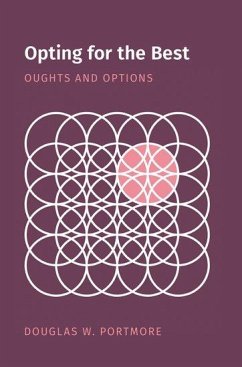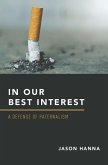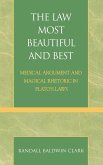- Gebundenes Buch
- Merkliste
- Auf die Merkliste
- Bewerten Bewerten
- Teilen
- Produkt teilen
- Produkterinnerung
- Produkterinnerung
When making decisions, we ought to choose the option that is best in terms of what ultimately matters. However, knowing what ultimately matters is not always enough when it comes to knowing what we ought to do. In Opting for the Best, Douglas Portmore examines the questions that remain after we have determined what matters. In doing so, he engages with some of the most complex puzzles concerning what we ought to do, including those involving supererogation,indeterminate or overdetermined outcomes, predictable future misbehavior, among others.
Andere Kunden interessierten sich auch für
![In Our Best Interest In Our Best Interest]() Jason HannaIn Our Best Interest125,99 €
Jason HannaIn Our Best Interest125,99 €![Best Things in Life Best Things in Life]() Thomas HurkaBest Things in Life20,99 €
Thomas HurkaBest Things in Life20,99 €![The Best of All Possible Worlds? Leibniz's Philosophical Optimism and Its Critics 1710-1755 The Best of All Possible Worlds? Leibniz's Philosophical Optimism and Its Critics 1710-1755]() Hernán D CaroThe Best of All Possible Worlds? Leibniz's Philosophical Optimism and Its Critics 1710-1755148,99 €
Hernán D CaroThe Best of All Possible Worlds? Leibniz's Philosophical Optimism and Its Critics 1710-1755148,99 €![The Law Most Beautiful and Best The Law Most Beautiful and Best]() Randall Baldwin ClarkThe Law Most Beautiful and Best127,99 €
Randall Baldwin ClarkThe Law Most Beautiful and Best127,99 €![To the Best of Our Knowledge To the Best of Our Knowledge]() Sanford C GoldbergTo the Best of Our Knowledge86,99 €
Sanford C GoldbergTo the Best of Our Knowledge86,99 €![The Manual of Liberty, Or, Testimonies in Behalf of the Rights of Mankind; Selected From the Best Authorities, in Prose and Verse, and Methodically Arranged The Manual of Liberty, Or, Testimonies in Behalf of the Rights of Mankind; Selected From the Best Authorities, in Prose and Verse, and Methodically Arranged]() Pre- Imprint CollectionThe Manual of Liberty, Or, Testimonies in Behalf of the Rights of Mankind; Selected From the Best Authorities, in Prose and Verse, and Methodically Arranged44,99 €
Pre- Imprint CollectionThe Manual of Liberty, Or, Testimonies in Behalf of the Rights of Mankind; Selected From the Best Authorities, in Prose and Verse, and Methodically Arranged44,99 €![Modern Infidelity and the Best Methods of Counteracting It Modern Infidelity and the Best Methods of Counteracting It]() Robert Payne SmithModern Infidelity and the Best Methods of Counteracting It33,99 €
Robert Payne SmithModern Infidelity and the Best Methods of Counteracting It33,99 €-
-
-
When making decisions, we ought to choose the option that is best in terms of what ultimately matters. However, knowing what ultimately matters is not always enough when it comes to knowing what we ought to do. In Opting for the Best, Douglas Portmore examines the questions that remain after we have determined what matters. In doing so, he engages with some of the most complex puzzles concerning what we ought to do, including those involving supererogation,indeterminate or overdetermined outcomes, predictable future misbehavior, among others.
Hinweis: Dieser Artikel kann nur an eine deutsche Lieferadresse ausgeliefert werden.
Hinweis: Dieser Artikel kann nur an eine deutsche Lieferadresse ausgeliefert werden.
Produktdetails
- Produktdetails
- Verlag: Oxford University Press
- Seitenzahl: 346
- Erscheinungstermin: 10. Juli 2019
- Englisch
- Abmessung: 241mm x 169mm x 35mm
- Gewicht: 612g
- ISBN-13: 9780190945350
- ISBN-10: 0190945354
- Artikelnr.: 54851497
- Herstellerkennzeichnung
- Produktsicherheitsverantwortliche/r
- Europaallee 1
- 36244 Bad Hersfeld
- gpsr@libri.de
- Verlag: Oxford University Press
- Seitenzahl: 346
- Erscheinungstermin: 10. Juli 2019
- Englisch
- Abmessung: 241mm x 169mm x 35mm
- Gewicht: 612g
- ISBN-13: 9780190945350
- ISBN-10: 0190945354
- Artikelnr.: 54851497
- Herstellerkennzeichnung
- Produktsicherheitsverantwortliche/r
- Europaallee 1
- 36244 Bad Hersfeld
- gpsr@libri.de
Douglas W. Portmore is Professor of Philosophy in the School of Historical, Philosophical, and Religious Studies at Arizona State University. He is the author of Commonsense Consequentialism: Wherein Morality Meets Rationality (New York: Oxford University Press, 2011) and is an Associate Editor for Ethics: An International Journal of Social, Political and Legal Philosophy . His research focuses mainly on morality, rationality, and the interconnections between the two, but he has also written on well-being, posthumous harm, and the non-identity problem.
* Preface
* Acknowledgements
* 1. Opting for the Best
* 1.1 The Opting-for-the-Best View
* 1.1.1. Perhaps, some options that ought to be performed are
suboptimal
* 1.1.2. Not all possible events are eligible for deontic status
* 1.1.3. Alternatives matter
* 1.1.4. Oughts versus obligations
* 1.1.5. Best option versus best outcome
* 1.1.6. The best must be sufficiently good
* 1.1.7. 'Option' versus 'can'
* 1.1.8. Objective oughts versus subjective oughts
* 1.1.9. Directive oughts versus evaluative oughts
* 1.2 The Ecumenical Nature of the View
* 1.3 A Potential Objection to the Opting-for-the-Best View
* 1.4 Remaining Controversies and the Plan for the Rest of the Book
* 2. What are our options?
* 2.1 The Need to Restrict What Can Count as an Option
* 2.2 The Necessity of Control
* 2.3 The Sufficiency of Control
* 2.4 Conclusion
* 3. What's the relevant sort of control?
* 3.1 Complete and Synchronic Control
* 3.2 Personal Control versus Sub-Personal Control
* 3.3 Rational Control versus Volitional Control
* 3.3.1. Formations of attitudes
* 3.3.2. Mixed acts
* 3.3.3. Automatic, unthinking acts
* 3.3.4. Acts stemming from volitions that weren't under the subject's
rational control
* 3.3.5. Acts that manifested a poor quality of will and were
expressive of one's deep self but were not under one's rational
control
* 3.3.6. Lapses
* 3.4 Volitional Control and the Trouble with Insisting on Always
Tracing Back to Some Intentional Act
* 3.5 What about voluntary control?
* 3.6 Conclusion
* 4. Which options have their deontic statuses in virtue of their own
goodness?
* 4.1 Omnism (All Options) and the Problem of Act Versions
* 4.2 Nonnullusism (Only Some Options)
* 4.3 Nullusism (No Option)
* 4.4 Supererogation and the Latitude Problem
* 4.5 Supererogation and Evaluative Inheritance
* 4.6 Three Objections to Maximalism
* 4.6.1. Ross's Paradox
* 4.6.2. The Arbitrariness Objection
* 4.6.3. The Implausible Grounds Objection
* 4.7 The Implications of Maximalism
* 5. Rationalist Maximalism
* 5.1 Three More Objections to Maximalism
* 5.1.1. The 'Did ?'-Implies-'Had the option to ?' Objection
* 5.1.2. Gustafsson's Objection
* 5.1.3. The Professor Procrastinate Objection
* 5.2 The Actualism/Possibilism Distinction versus the
Omnism/Maximalism Distinction
* 5.3 The Principle of Moral Harmony and the Problem of
Overdetermination
* 5.4 Conclusion
* 6. Maximalism and the Ought-Most-Reason View
* 6.1 Omnism and Maximalism about Reasons
* 6.2 The Inheritance Problem for Omnism
* 6.3 The Intuition Problem for Omnism
* 6.4 The All or Nothing Problem for Omnism
* 6.5 Maximalism and the Basic Belief
* 6.6 Objections to Maximalism about Reasons
* 6.6.1. Incorrect Explanation
* 6.6.2. Incorrect Weights
* 6.6.3. Incorrect Account of Instrumental Reasons
* 6.6.4. Incorrect Account of Reasons to Perform Acts with Side Effects
* 6.7 Conclusion
* 7. Which, if either, are we to assess directly in terms of what
ultimately matters: our options or their prospects?
* 7.1 A Case Study: Teleology, Deontology, Non-Teleology, and
Agent-Centered Constraints
* 7.2 Ignorance versus Indeterminacy
* 7.3 Indeterminacy and Subjective Rightness
* 7.4 Indeterminacy and Objective Rightness
* 7.5 A Teleological Approach
* 7.6 Rationalist Teleological Maximalism
* 8. Rationalist Teleological Maximalism
* 8.1 An Illustration of How Rationalist Teleological Maximalism Works
* 8.2 Rationalist Teleological Maximalism's Many Virtues
* 8.3 On What Matters and the Importance of Structure
* Glossary
* Bibliography
* Index
* Acknowledgements
* 1. Opting for the Best
* 1.1 The Opting-for-the-Best View
* 1.1.1. Perhaps, some options that ought to be performed are
suboptimal
* 1.1.2. Not all possible events are eligible for deontic status
* 1.1.3. Alternatives matter
* 1.1.4. Oughts versus obligations
* 1.1.5. Best option versus best outcome
* 1.1.6. The best must be sufficiently good
* 1.1.7. 'Option' versus 'can'
* 1.1.8. Objective oughts versus subjective oughts
* 1.1.9. Directive oughts versus evaluative oughts
* 1.2 The Ecumenical Nature of the View
* 1.3 A Potential Objection to the Opting-for-the-Best View
* 1.4 Remaining Controversies and the Plan for the Rest of the Book
* 2. What are our options?
* 2.1 The Need to Restrict What Can Count as an Option
* 2.2 The Necessity of Control
* 2.3 The Sufficiency of Control
* 2.4 Conclusion
* 3. What's the relevant sort of control?
* 3.1 Complete and Synchronic Control
* 3.2 Personal Control versus Sub-Personal Control
* 3.3 Rational Control versus Volitional Control
* 3.3.1. Formations of attitudes
* 3.3.2. Mixed acts
* 3.3.3. Automatic, unthinking acts
* 3.3.4. Acts stemming from volitions that weren't under the subject's
rational control
* 3.3.5. Acts that manifested a poor quality of will and were
expressive of one's deep self but were not under one's rational
control
* 3.3.6. Lapses
* 3.4 Volitional Control and the Trouble with Insisting on Always
Tracing Back to Some Intentional Act
* 3.5 What about voluntary control?
* 3.6 Conclusion
* 4. Which options have their deontic statuses in virtue of their own
goodness?
* 4.1 Omnism (All Options) and the Problem of Act Versions
* 4.2 Nonnullusism (Only Some Options)
* 4.3 Nullusism (No Option)
* 4.4 Supererogation and the Latitude Problem
* 4.5 Supererogation and Evaluative Inheritance
* 4.6 Three Objections to Maximalism
* 4.6.1. Ross's Paradox
* 4.6.2. The Arbitrariness Objection
* 4.6.3. The Implausible Grounds Objection
* 4.7 The Implications of Maximalism
* 5. Rationalist Maximalism
* 5.1 Three More Objections to Maximalism
* 5.1.1. The 'Did ?'-Implies-'Had the option to ?' Objection
* 5.1.2. Gustafsson's Objection
* 5.1.3. The Professor Procrastinate Objection
* 5.2 The Actualism/Possibilism Distinction versus the
Omnism/Maximalism Distinction
* 5.3 The Principle of Moral Harmony and the Problem of
Overdetermination
* 5.4 Conclusion
* 6. Maximalism and the Ought-Most-Reason View
* 6.1 Omnism and Maximalism about Reasons
* 6.2 The Inheritance Problem for Omnism
* 6.3 The Intuition Problem for Omnism
* 6.4 The All or Nothing Problem for Omnism
* 6.5 Maximalism and the Basic Belief
* 6.6 Objections to Maximalism about Reasons
* 6.6.1. Incorrect Explanation
* 6.6.2. Incorrect Weights
* 6.6.3. Incorrect Account of Instrumental Reasons
* 6.6.4. Incorrect Account of Reasons to Perform Acts with Side Effects
* 6.7 Conclusion
* 7. Which, if either, are we to assess directly in terms of what
ultimately matters: our options or their prospects?
* 7.1 A Case Study: Teleology, Deontology, Non-Teleology, and
Agent-Centered Constraints
* 7.2 Ignorance versus Indeterminacy
* 7.3 Indeterminacy and Subjective Rightness
* 7.4 Indeterminacy and Objective Rightness
* 7.5 A Teleological Approach
* 7.6 Rationalist Teleological Maximalism
* 8. Rationalist Teleological Maximalism
* 8.1 An Illustration of How Rationalist Teleological Maximalism Works
* 8.2 Rationalist Teleological Maximalism's Many Virtues
* 8.3 On What Matters and the Importance of Structure
* Glossary
* Bibliography
* Index
* Preface
* Acknowledgements
* 1. Opting for the Best
* 1.1 The Opting-for-the-Best View
* 1.1.1. Perhaps, some options that ought to be performed are
suboptimal
* 1.1.2. Not all possible events are eligible for deontic status
* 1.1.3. Alternatives matter
* 1.1.4. Oughts versus obligations
* 1.1.5. Best option versus best outcome
* 1.1.6. The best must be sufficiently good
* 1.1.7. 'Option' versus 'can'
* 1.1.8. Objective oughts versus subjective oughts
* 1.1.9. Directive oughts versus evaluative oughts
* 1.2 The Ecumenical Nature of the View
* 1.3 A Potential Objection to the Opting-for-the-Best View
* 1.4 Remaining Controversies and the Plan for the Rest of the Book
* 2. What are our options?
* 2.1 The Need to Restrict What Can Count as an Option
* 2.2 The Necessity of Control
* 2.3 The Sufficiency of Control
* 2.4 Conclusion
* 3. What's the relevant sort of control?
* 3.1 Complete and Synchronic Control
* 3.2 Personal Control versus Sub-Personal Control
* 3.3 Rational Control versus Volitional Control
* 3.3.1. Formations of attitudes
* 3.3.2. Mixed acts
* 3.3.3. Automatic, unthinking acts
* 3.3.4. Acts stemming from volitions that weren't under the subject's
rational control
* 3.3.5. Acts that manifested a poor quality of will and were
expressive of one's deep self but were not under one's rational
control
* 3.3.6. Lapses
* 3.4 Volitional Control and the Trouble with Insisting on Always
Tracing Back to Some Intentional Act
* 3.5 What about voluntary control?
* 3.6 Conclusion
* 4. Which options have their deontic statuses in virtue of their own
goodness?
* 4.1 Omnism (All Options) and the Problem of Act Versions
* 4.2 Nonnullusism (Only Some Options)
* 4.3 Nullusism (No Option)
* 4.4 Supererogation and the Latitude Problem
* 4.5 Supererogation and Evaluative Inheritance
* 4.6 Three Objections to Maximalism
* 4.6.1. Ross's Paradox
* 4.6.2. The Arbitrariness Objection
* 4.6.3. The Implausible Grounds Objection
* 4.7 The Implications of Maximalism
* 5. Rationalist Maximalism
* 5.1 Three More Objections to Maximalism
* 5.1.1. The 'Did ?'-Implies-'Had the option to ?' Objection
* 5.1.2. Gustafsson's Objection
* 5.1.3. The Professor Procrastinate Objection
* 5.2 The Actualism/Possibilism Distinction versus the
Omnism/Maximalism Distinction
* 5.3 The Principle of Moral Harmony and the Problem of
Overdetermination
* 5.4 Conclusion
* 6. Maximalism and the Ought-Most-Reason View
* 6.1 Omnism and Maximalism about Reasons
* 6.2 The Inheritance Problem for Omnism
* 6.3 The Intuition Problem for Omnism
* 6.4 The All or Nothing Problem for Omnism
* 6.5 Maximalism and the Basic Belief
* 6.6 Objections to Maximalism about Reasons
* 6.6.1. Incorrect Explanation
* 6.6.2. Incorrect Weights
* 6.6.3. Incorrect Account of Instrumental Reasons
* 6.6.4. Incorrect Account of Reasons to Perform Acts with Side Effects
* 6.7 Conclusion
* 7. Which, if either, are we to assess directly in terms of what
ultimately matters: our options or their prospects?
* 7.1 A Case Study: Teleology, Deontology, Non-Teleology, and
Agent-Centered Constraints
* 7.2 Ignorance versus Indeterminacy
* 7.3 Indeterminacy and Subjective Rightness
* 7.4 Indeterminacy and Objective Rightness
* 7.5 A Teleological Approach
* 7.6 Rationalist Teleological Maximalism
* 8. Rationalist Teleological Maximalism
* 8.1 An Illustration of How Rationalist Teleological Maximalism Works
* 8.2 Rationalist Teleological Maximalism's Many Virtues
* 8.3 On What Matters and the Importance of Structure
* Glossary
* Bibliography
* Index
* Acknowledgements
* 1. Opting for the Best
* 1.1 The Opting-for-the-Best View
* 1.1.1. Perhaps, some options that ought to be performed are
suboptimal
* 1.1.2. Not all possible events are eligible for deontic status
* 1.1.3. Alternatives matter
* 1.1.4. Oughts versus obligations
* 1.1.5. Best option versus best outcome
* 1.1.6. The best must be sufficiently good
* 1.1.7. 'Option' versus 'can'
* 1.1.8. Objective oughts versus subjective oughts
* 1.1.9. Directive oughts versus evaluative oughts
* 1.2 The Ecumenical Nature of the View
* 1.3 A Potential Objection to the Opting-for-the-Best View
* 1.4 Remaining Controversies and the Plan for the Rest of the Book
* 2. What are our options?
* 2.1 The Need to Restrict What Can Count as an Option
* 2.2 The Necessity of Control
* 2.3 The Sufficiency of Control
* 2.4 Conclusion
* 3. What's the relevant sort of control?
* 3.1 Complete and Synchronic Control
* 3.2 Personal Control versus Sub-Personal Control
* 3.3 Rational Control versus Volitional Control
* 3.3.1. Formations of attitudes
* 3.3.2. Mixed acts
* 3.3.3. Automatic, unthinking acts
* 3.3.4. Acts stemming from volitions that weren't under the subject's
rational control
* 3.3.5. Acts that manifested a poor quality of will and were
expressive of one's deep self but were not under one's rational
control
* 3.3.6. Lapses
* 3.4 Volitional Control and the Trouble with Insisting on Always
Tracing Back to Some Intentional Act
* 3.5 What about voluntary control?
* 3.6 Conclusion
* 4. Which options have their deontic statuses in virtue of their own
goodness?
* 4.1 Omnism (All Options) and the Problem of Act Versions
* 4.2 Nonnullusism (Only Some Options)
* 4.3 Nullusism (No Option)
* 4.4 Supererogation and the Latitude Problem
* 4.5 Supererogation and Evaluative Inheritance
* 4.6 Three Objections to Maximalism
* 4.6.1. Ross's Paradox
* 4.6.2. The Arbitrariness Objection
* 4.6.3. The Implausible Grounds Objection
* 4.7 The Implications of Maximalism
* 5. Rationalist Maximalism
* 5.1 Three More Objections to Maximalism
* 5.1.1. The 'Did ?'-Implies-'Had the option to ?' Objection
* 5.1.2. Gustafsson's Objection
* 5.1.3. The Professor Procrastinate Objection
* 5.2 The Actualism/Possibilism Distinction versus the
Omnism/Maximalism Distinction
* 5.3 The Principle of Moral Harmony and the Problem of
Overdetermination
* 5.4 Conclusion
* 6. Maximalism and the Ought-Most-Reason View
* 6.1 Omnism and Maximalism about Reasons
* 6.2 The Inheritance Problem for Omnism
* 6.3 The Intuition Problem for Omnism
* 6.4 The All or Nothing Problem for Omnism
* 6.5 Maximalism and the Basic Belief
* 6.6 Objections to Maximalism about Reasons
* 6.6.1. Incorrect Explanation
* 6.6.2. Incorrect Weights
* 6.6.3. Incorrect Account of Instrumental Reasons
* 6.6.4. Incorrect Account of Reasons to Perform Acts with Side Effects
* 6.7 Conclusion
* 7. Which, if either, are we to assess directly in terms of what
ultimately matters: our options or their prospects?
* 7.1 A Case Study: Teleology, Deontology, Non-Teleology, and
Agent-Centered Constraints
* 7.2 Ignorance versus Indeterminacy
* 7.3 Indeterminacy and Subjective Rightness
* 7.4 Indeterminacy and Objective Rightness
* 7.5 A Teleological Approach
* 7.6 Rationalist Teleological Maximalism
* 8. Rationalist Teleological Maximalism
* 8.1 An Illustration of How Rationalist Teleological Maximalism Works
* 8.2 Rationalist Teleological Maximalism's Many Virtues
* 8.3 On What Matters and the Importance of Structure
* Glossary
* Bibliography
* Index








